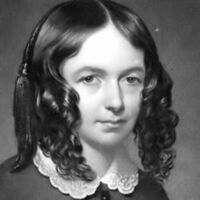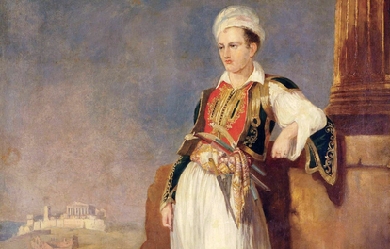Bertha in the Lane
I.
Put the broidery—frame away,
For my sewing is all done:
The last thread is used to—day,
And I need not join it on.
Though the clock stands at the noon
I am weary. I have sewn,
Sweet, for thee, a wedding—gown.
II.
Sister, help me to the bed,
And stand near me, Dearest—sweet.
Do not shrink nor be afraid,
Blushing with a sudden heat!
No one standeth in the street?—
By God’s love I go to meet,
Love I thee with love complete.
III.
Lean thy face down; drop it in
These two hands, that I may hold
‘Twixt their palms thy cheek and chin,
Stroking back the curls of gold:
’T is a fair, fair face, in sooth—
Larger eyes and redder mouth
Than mine were in my first youth.
IV.
Thou art younger by seven years—
Ah!—so bashful at my gaze,
That the lashes, hung with tears,
Grow too heavy to upraise?
I would wound thee by no touch
Which thy shyness feels as such.
Dost thou mind me, Dear, so much?
V.
Have I not been nigh a mother
To thy sweetness—tell me, Dear?
Have we not loved one another
Tenderly, from year to year,
Since our dying mother mild
Said with accents undefiled,
“Child, be mother to this child”!
VI.
Mother, mother, up in heaven,
Stand up on the jasper sea,
And be witness I have given
All the gifts required of me,—
Hope that blessed me, bliss that crowned,
Love that left me with a wound,
Life itself that turneth round!
VII.
Thou art standing in the room,
In a molten glory shrined
That rays off into the gloom!
But thy smile is bright and bleak
Like cold waves—I cannot speak,
I sob in it, and grow weak.
VIII.
Ghostly mother, keep aloof
One hour longer from my soul,
For I still am thinking of
Earth’s warm—beating joy and dole!
On my finger is a ring
Which I still see glittering
When the night hides everything.
IX.
Little sister, thou art pale!
Ah, I have a wandering brain—
But I lose that fever—bale,
And my thoughts grow calm again.
Lean down closer—closer still!
I have words thine ear to fill,
And would kiss thee at my will.
X.
Dear, I heard thee in the spring,
Thee and Robert—through the trees,—
When we all went gathering
Boughs of May—bloom for the bees.
Do not start so! think instead
How the sunshine overhead
Seemed to trickle through the shade.
XI.
What a day it was, that day!
Hills and vales did openly
Seem to heave and throb away
At the sight of the great sky:
And the silence, as it stood
In the glory’s golden flood,
Audibly did bud, and bud.
XII.
Through the winding hedgerows green,
How we wandered, I and you,
With the bowery tops shut in,
And the gates that showed the view!
How we talked there; thrushes soft
Sang our praises out, or oft
Bleatings took them from the croft:
XIII.
Till the pleasure grown too strong
Left me muter evermore,
And, the winding road being long,
I walked out of sight, before,
And so, wrapt in musings fond,
Issued (past the wayside pond)
On the meadow—lands beyond.
XIV.
I sate down beneath the beech
Which leans over to the lane,
And the far sound of your speech
Did not promise any pain;
And I blessed you full and free,
With a smile stooped tenderly
O’er the May—flowers on my knee.
XV.
But the sound grew into word
As the speakers drew more near—
Sweet, forgive me that I heard
What you wished me not to hear.
Do not weep so, do not shake,
Oh,—I heard thee, Bertha, make
Good true answers for my sake.
XVI.
Yes, and HE too! let him stand
In thy thoughts, untouched by blame.
Could he help it, if my hand
He had claimed with hasty claim?
That was wrong perhaps—but then
Such things be—and will, again.
Women cannot judge for men.
XVII.
Had he seen thee when he swore
He would love but me alone?
Thou wast absent, sent before
To our kin in Sidmouth town.
When he saw thee who art best
Past compare, and loveliest.
He but judged thee as the rest.
XVIII.
Could we blame him with grave words,
Thou and I, Dear, if we might?
Thy brown eyes have looks like birds
Flying straightway to the light:
Mine are older.—Hush!—look out—
Up the street! Is none without?
How the poplar swings about!
XIX.
And that hour—beneath the beech,
When I listened in a dream,
And he said in his deep speech
That he owed me all esteem,—
Each word swam in on my brain
With a dim, dilating pain,
Till it burst with that last strain.
XX.
I fell flooded with a dark,
In the silence of a swoon.
When I rose, still cold and stark,
There was night; I saw the moon
And the stars, each in its place,
And the May—blooms on the grass,
Seemed to wonder what I was.
XXI.
And I walked as if apart
From myself, when I could stand,
And I pitied my own heart,
As if I held it in my hand—
Somewhat coldly, with a sense
Of fulfilled benevolence,
And a “Poor thing” negligence.
XXII.
And I answered coldly too,
When you met me at the door;
And I only heard the dew
Dripping from me to the floor:
And the flowers, I bade you see,
Were too withered for the bee,—
As my life, henceforth, for me.
XXIII.
Do not weep so—Dear,—heart—warm!
All was best as it befell.
If I say he did me harm,
I speak wild,—I am not well.
All his words were kind and good—
He esteemed me. Only, blood
Runs so faint in womanhood!
XXIV.
Then I always was too grave,—
Liked the saddest ballad sung,—
With that look, besides, we have
In our faces, who die young.
I had died, Dear, all the same;
Life’s long, joyous, jostling game
Is too loud for my meek shame.
XXV.
We are so unlike each other,
Thou and I, that none could guess
We were children of one mother,
But for mutual tenderness.
Thou art rose—lined from the cold,
And meant verily to hold
Life’s pure pleasures manifold.
XXVI.
I am pale as crocus grows
Close beside a rose—tree’s root;
Whosoe’er would reach the rose,
Treads the crocus underfoot.
I, like May—bloom on thorn—tree,
Thou, like merry summer—bee,—
Fit that I be plucked for thee!
XXVII.
Yet who plucks me?—no one mourns,
I have lived my season out,
And now die of my own thorns
Which I could not live without.
Sweet, be merry! How the light
Comes and goes! If it be night,
Keep the candles in my sight.
XXVIII.
Are there footsteps at the door?
Look out quickly. Yea, or nay?
Some one might be waiting for
Some last word that I might say.
Nay? So best!—so angels would
Stand off clear from deathly road,
Not to cross the sight of God.
XXIX.
Colder grow my hands and feet.
When I wear the shroud I made,
Let the folds lie straight and neat,
And the rosemary be spread,
That if any friend should come,
(To see thee, Sweet!) all the room
May be lifted out of gloom.
XXX.
And, dear Bertha, let me keep
On my hand this little ring,
Which at nights, when others sleep,
I can still see glittering!
Let me wear it out of sight,
In the grave,—where it will light
All the dark up, day and night.
XXXI.
On that grave drop not a tear!
Else, though fathom—deep the place,
Through the woollen shroud I wear
I shall feel it on my face.
Rather smile there, blessed one,
Thinking of me in the sun,
Or forget me—smiling on!
XXXII.
Art thou near me? nearer! so—
Kiss me close upon the eyes,
That the earthly light may go
Sweetly, as it used to rise
When I watched the morning—grey
Strike, betwixt the hills, the way
He was sure to come that day.
XXXIII.
So,—no more vain words be said!
The hosannas nearer roll.
Mother, smile now on thy Dead,
I am death—strong in my soul.
Mystic Dove alit on cross,
Guide the poor bird of the snows
Through the snow—wind above loss!
XXXIV.
Jesus, Victim, comprehending
Love’s divine self—abnegation,
Cleanse my love in its self—spending,
And absorb the poor libation!
Wind my thread of life up higher,
Up, through angels’ hands of fire!
I aspire while I expire.


